If you're a fan of the incredibly addictive Civilization strategy series and haven't bought Civilization IV yet, you can probably stop reading now to go buy the game. Civ IV makes plenty of great changes and additions to just about every aspect of the hazardously habit-forming strategy blueprint that famed designer Sid Meier and his talented team have made famous the world over, from combat to diplomacy to research to production to winning the space race. And just like with previous games in the series, Civ IV's varied and addictive gameplay offers the same tantalizing siren's song that will tempt you to take "just one more turn." Fundamentally, this is a much-improved version of the same Civ games we've all been playing and desperately trying to put down for years. And that's far from a bad thing. In fact, it's an awesome thing.
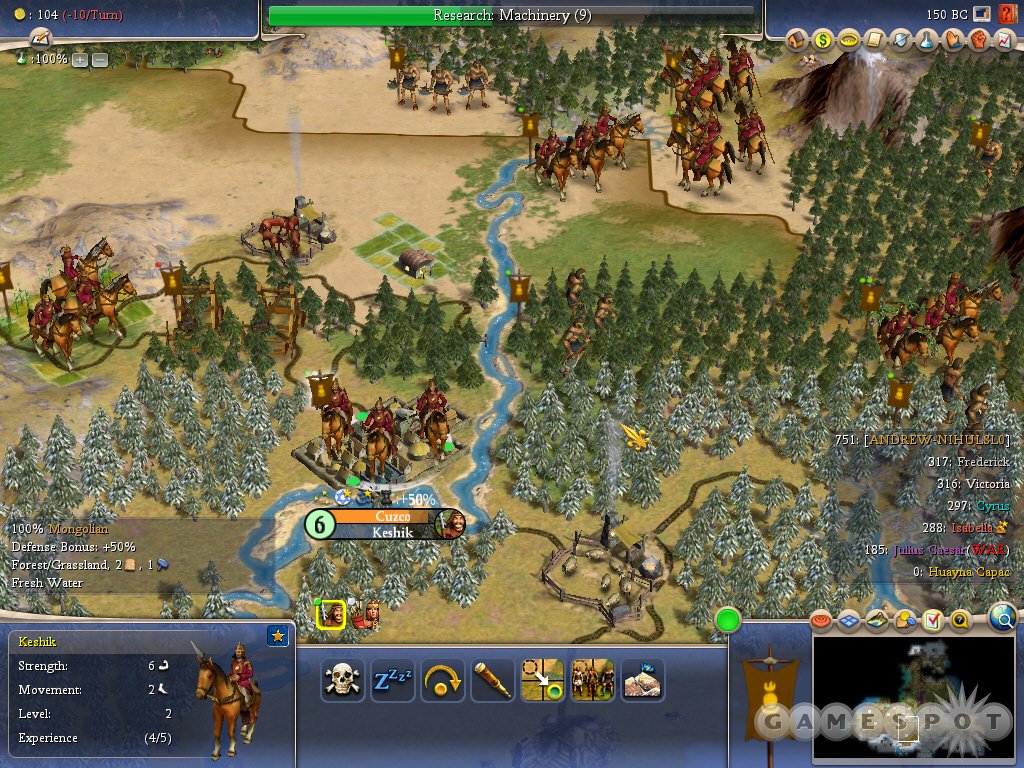
If you're familiar with the Civilization series, then you're already well aware that they've traditionally been turn-based strategy games that let you play as the political leader of one of the world's nations (such as Gandhi of India or Julius Caesar of Rome) in a fictitious bid to take over the globe, starting from the Stone Age and continuing right on through to the Space Age by having a lone settler unit build your first city on the way to establishing whatever advanced society you choose to design over the course of dozens of turns. The series gives you plenty of ways to do this, such as conquering your neighbors, researching advanced technology, or, in Civilization III (and IV), creating the most cultured society on the planet. It's this great variety that helps give Civ IV the same alarmingly addictive quality its predecessors carried. And thanks to its many improvements, major and minor, and its greater emphasis on strategy over bean-counting, Civ IV isn't just as good as Civ has ever been...it's better.
Like in previous games, your political leader has two special traits that will influence his or her reign, though all the game's traits are new, such as "organized," which cuts down on maintenance costs, or "expansive," which generates bonus health in cities and helps hasten growth and expansion. And Civilization IV fundamentally offers the same goals, but in a much more evolved, more strategic, and ultimately more rewarding manner. And each of these goals comes with many more options, which should open the game up to players with busy schedules...even if it may still seem overwhelming to beginners.
The Civ series' gameplay has several components, and almost every single one of them is improved in Civ IV. For instance, the series' combat system, which pits different military units against one another based on relative unit strength and technology, has been changed to a "strength" system that seems more intuitive. Units that are greatly advanced will have a clear advantage over more-primitive ones (to avoid the commonly cited, though rare, case of a tribal spearman defeating a tank in previous games), and military units in general have many different upgrades they can earn as they receive experience points and gain power levels. In addition, artillery has been tweaked to be much more useful. It can bombard targets, such as enemy cities, to lower defenses and to deal collateral damage to large "stacks" of armies. These improvements don't make battles all that much more complicated , but they do add more depth to combat, since both attackers and defenders have more factors to consider.
Civ IV has also improved on the way diplomacy works. While you can still make nice with your neighbors (and you can even win the game with a diplomatic victory condition), you have more options than just trading goods, cities, technologies, and/or relations. You can attempt to influence your neighbors to make war or peace with other neighbors, and you can even fence everyone out of your backyard using the game's new "open borders" system. In previous games, neighboring nations could send their city-building settlers and their soldiers wandering across your nation, free to declare war on your vulnerable home cities and worker civilians unless you complained strenuously (which sometimes caused them to declare war anyway). In Civ IV, the new border system means that no units from any other country can enter yours unless you have agreed to open borders with that particular country...or unless you're at war with that particular country. This is a godsend for defensive players who prefer to hang back to develop an economic, scientific, or cultural infrastructure without fear of ambush. However, even this new addition is balanced, since keeping your borders locked up tightly and never coming to your neighbors' aid doesn't make many friends. Other nations actually remember your actions and are poorly disposed if you refuse them too many favors.
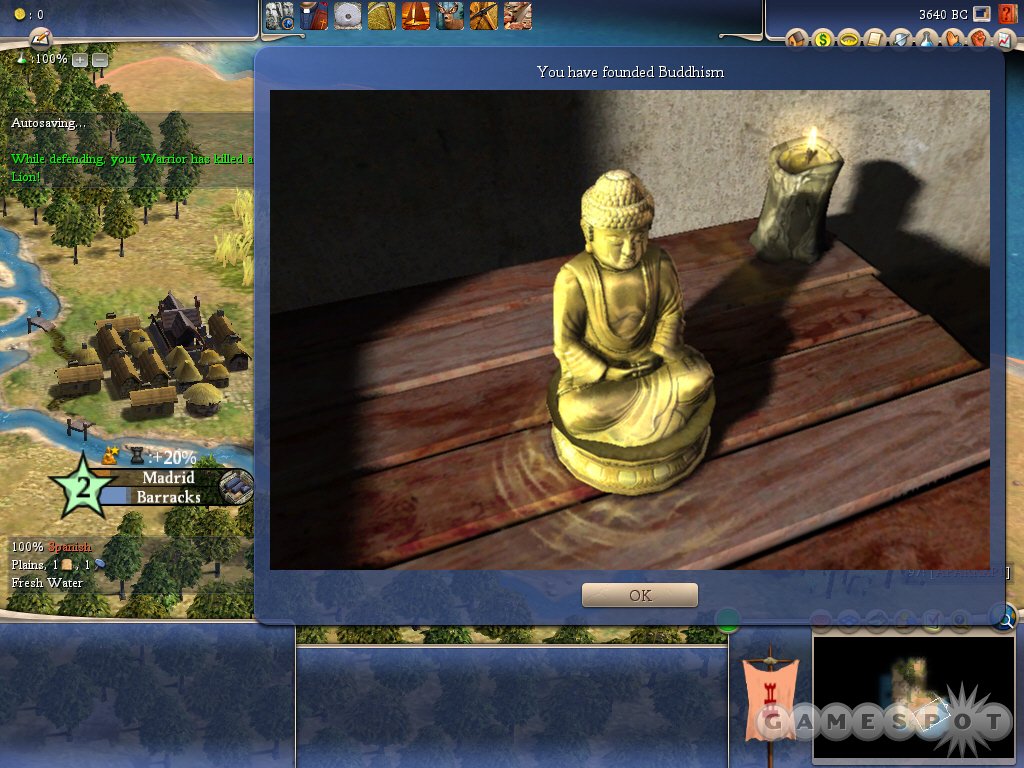
You can make neighboring cities more apt to like you by adopting the same religion. One of Civ IV's brand-new features is the religion system, which is an intriguing addition, even if it isn't crucial to your success. The game's new religion system adds seven new creeds to the game, each of which is tied to a specific technology and each of which can influence your cities' culture-producing temple structures and missionaries. However, aside from the facts that some religions become available earlier in the game than others (since they're tied to earlier technologies) and that different religions lead to a different unique building (more on that later), all religions are pretty similar. Your overriding goal, should you choose to pursue a religious path, is to have all your cities--and your rival nations' cities--subscribe to the same faith: yours. Religious buildings also produce a bonus to culture, which is helpful if you're pursuing a strategy of rapid expansion (since cities with high culture automatically expand to take up more of the map, just like in Civ III) or of cultural victory. But there's no religion-based victory condition, and aside from these bonuses, religion isn't a hugely influential addition to the game. And it doesn't actually need to be a part of your strategy.
On the other hand, pursuing a strategy of cultural supremacy has been greatly improved in Civ IV. Nearly all cities generate a certain number of "culture points" by default each turn, so focusing heavily on cultural expansion by building culture-producing structures in your towns--such as religious temples--can hasten your expansion that much more quickly. If you focus specifically on developing your cities along a specific strategy, such as cultural advancement, they may produce a "great person," one of the game's all-new special units.

The new great people system is an interesting and useful addition that will probably be especially appreciated by experts. Great people can be expended in exchange for a number of powerful abilities. For instance, the culture-producing unit, the great artist, can be used to create an artistic masterpiece in a specific city, which drops a "culture bomb" that instantly generates thousands of culture points and greatly expands that city's borders. And depending on your strategy, as well as which technologies you've chosen to research, you'll also be able to create great military leaders, scientists, and religious prophets, who can all be used to create other powerful effects, like combining two or more great people to start a "golden age," in which your empire's production of units and structures is greatly increased. As it turns out, one of the game's all-new leader traits, "philosophical," increases your chances of producing a great person. So pursuing these powerful units seems like a viable strategy, though they don't seem overwhelmingly powerful, especially since they're extremely fragile and disappear whenever any of their abilities are used.
Civ IV makes a turn for the better by emphasizing strategic planning in general, which ultimately makes the game more balanced. For instance, worker units, which could previously only build a few improvements on land (such as roads, irrigation, and, later, railroad tracks), now have a huge number of appealing options to build, such as revenue-producing cottages, food-producing farms, animal-herding pastures, and many others. (And Civ IV's new interface lets you develop your cities without even opening the city menu.)
Also, just like in previous Civ games, you use each of your cities to produce units or structural improvements by expending production points over a series of turns. But unlike in previous games, if you change your project before it's done, you can't simply transfer those production points over to your new project. This old exploit, of building an expensive and time-consuming project (like a great wonder of the world) and then switching production at the last second by dumping the points into another project, is gone. And this is ultimately for the best, since you'll be making the decisions to invest in production before you start rather than halfway through. In addition, Civ IV has done away with Civ III's "industrious" leader trait, which sped production of all projects and was a bit too powerful in some cases. Every game of Civ IV has a much slower start, since all nations start off on even footing. But once they get started, every nation in the game has the ability to really get going quickly.
In response to fan requests to adjust the pace of the game, developer Firaxis has added three speeds: the surprisingly fast normal speed, the even-faster quick speed (in which you gain money, resources, and technology at a faster rate), and the slower-paced epic speed. While epic speed seems better suited to purists who prefer to take their time, the quick and the normal speed are conducive to much faster play. In fact, in quick speed it can actually take as little as an hour or two (or less) to take over the world. And even normal speed moves at a brisk pace.
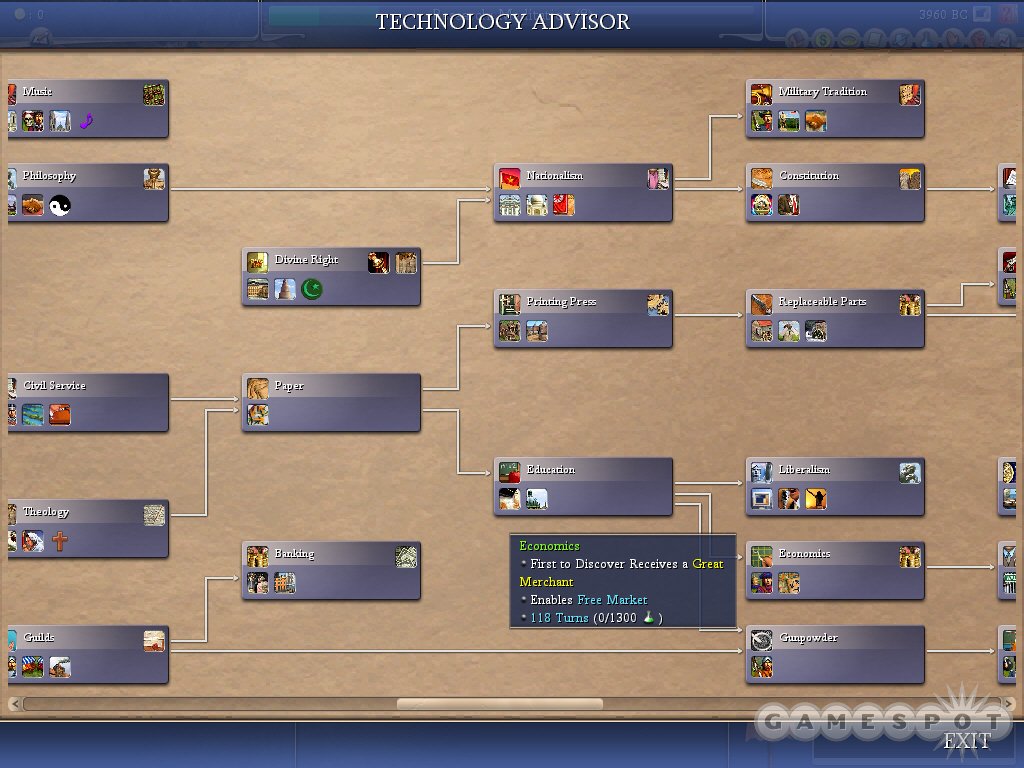
In fact, once you get your production and research going in the right direction, several of the game's early epochs will pass you by in a blur, as you're constantly bombarded by alert messages that let you know your cities have built this or that project, that you've researched this or that technology, that you've recovered this or that tech from a nearby tribal village (more commonly known as a "goodie hut," which is a random spot on the map that can offer free bonuses), or that you've advanced to a certain epoch. As it turns out, different technologies aren't tied to specific epochs anymore, so you're free to pursue some technologies in advance of others. In fact, fans of the Civilization series' focus on world history may be somewhat disappointed that Civ IV no longer emphasizes the different eras, or dresses up its world leaders in different clothing as time goes by. However, even if the passage of time sometimes seems to have less structure and less individual character, you'll still be up well past your bedtime playing the game.
Even single-player and multiplayer options have been improved in Civ IV. The single-player game offers much-improved artificial intelligence that seems to cheat much less than in previous games, or not at all. In the single-player game, rival nations won't mysteriously explore the entire world in two turns, nor will they use those two turns to magically build a network of five cities where there were none before. Computer-controlled nations will also make much more reasonable bids at the table, but they can't be easily bribed with small handfuls of cash, either. The single-player difficulty seems to scale extremely well by offering a very gentle introduction for beginners at the lowest levels and a suitably tough challenge for experts at the highest levels.
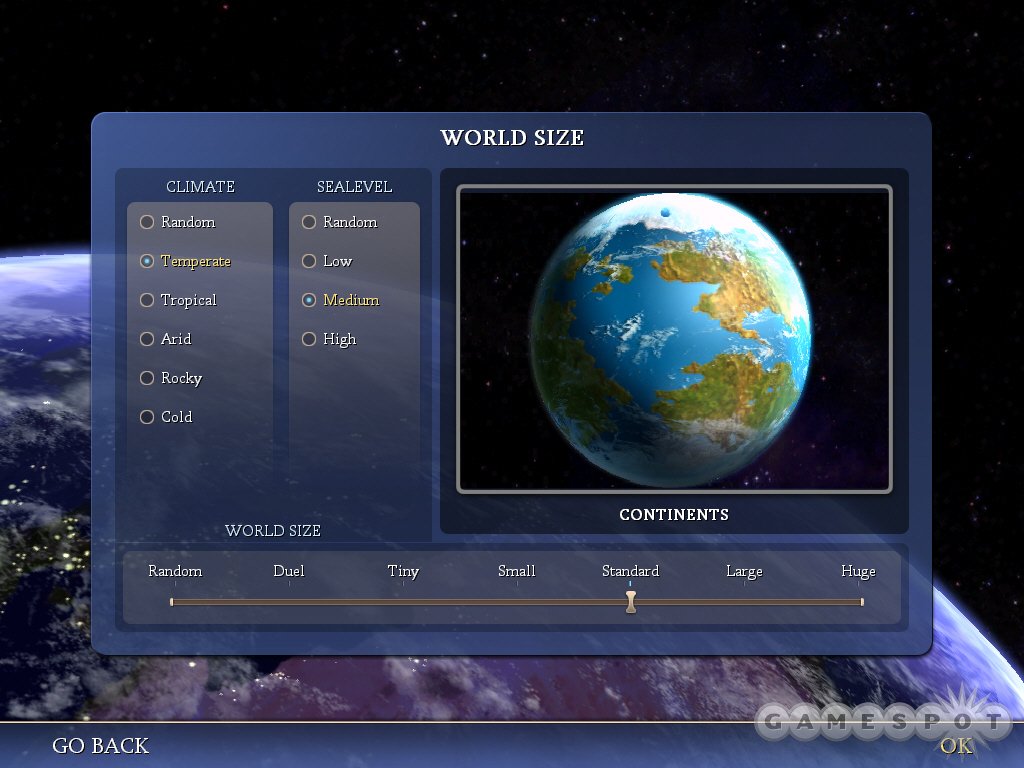
Multiplayer also seems to work quite well, and thanks to the game's faster pace, it seems much, much more realistic to actually finish multiplayer games, especially on the "quick" speed setting. And as you might expect from any good turn-based game, Civ IV also supports play-by-e-mail and hotseat multiplayer, along with LAN and Internet play. The game even ships with additional custom scenarios and three fan-made modifications that offer new play modes. However, the ship date was moved up almost a full month, and presumably as a result, the game does feature a "worldbuilder" and scripting tools, but doesn't feature the "pit boss" persistent online multiplayer options or the software development kit that should have given it the tremendous value it otherwise would have had. Then again, considering all the different variables you can tweak, such as new landmass layouts and random leader behavior, plus all the different ways you can play multiplayer (to say nothing of the eventual new modifications the active fan community will undoubtedly create), Civ IV will keep you very busy for a long time. Here's a suggestion, though: Just make sure that long time doesn't take the form of consecutive nightly hours before a big day at work or school.
Civ IV clearly has a lot to offer fans of the series, despite a few minor issues that will be of most trouble to beginners, and even then, not by much. Like in Civ III before it, Civ IV just has a lot of concepts to learn for beginners. These concepts aren't always adequately explained by the in-game "civlopedia" reference, which, like Civ III's in-game reference, uses a Web-page-like hyperlink interface to jump to different topics. And like in the previous game's civlopedia, Civ IV's is occasionally convoluted and disorganized, alternately switching between an iconic interface and a text interface. The game ships with a playable tutorial narrated by Sid Meier himself, but the tutorial only covers about half the game's key concepts. In addition, the late game can still end up being rather messy, as you have dozens of worker units across your sprawling empire working on various improvements, even though you'll only want to focus on a few different major developments. Fortunately, Civ IV at least offers better automation options that help fight the clutter--and in some later games, you'll be much better able to focus only on a few improvements and automate everything else.
Civ IV also presents itself well with a distinctive title-screen track that recalls the music of Disney's The Lion King, as well as several other nation-specific songs that loop endlessly during gameplay, some of which are more memorable than others. The most intriguing aspect of Civ IV's audio is the narration you'll hear at the beginning of every new game and each time you research a new technology--narration that's provided by none other than Leonard Nimoy of Star Trek fame. Nimoy's scholarly delivery of his lines adds a touch of class to the game, though you may grow too familiar with them over time, since the same lines are repeated for the same techs. And despite the lengthy rendered animation that introduces the game the first time it's loaded, Mr. Nimoy's dulcet voice is unfortunately squandered at the beginning of each new game session, as his profound "In the beginning..." speech accompanies a disappointing series of concept art sketches. This intro is an homage to the first Civilization, but considering the animated opening sequence, an equally impressive animated sequence, or at least a cleaner-looking presentation of those images seems like it should've been used here.
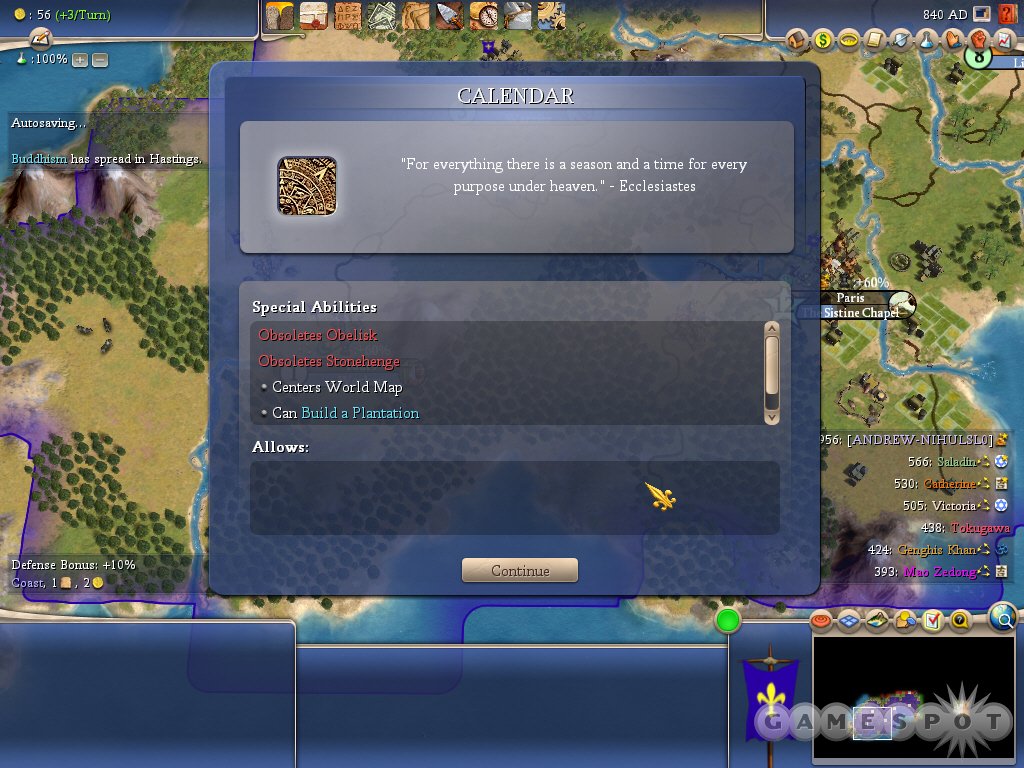
The actual game itself looks considerably better, even though the interface can seem a bit rough at times (for instance, several menu icons, like the advisor menus and next-turn button, are extremely small and are best ignored in favor of keyboard shortcuts). But these minor concerns aren't concerns at all for experts (who will use keyboard shortcuts), and they give way to a colorful 3D graphics engine that lets you zoom in and out of your holdings. The graphics engine also furnishes beautifully animated, expressive portraits of each of the world's great leaders, from the ceremonious George Washington to the flirtatious Catherine the Great.
You don't have to be a history buff to enjoy Civilization IV, though that would help...and so would previous experience with other Civ games. Beginners will find Civ IV to be a complex strategy game with something of a learning curve, but with worthwhile rewards waiting for them once they start figuring things out. Experts will find Civ IV to be the proverbial better mousetrap: adjusted, tweaked, and sometimes completely changed. But it's still a Civ game, and with Civ IV, the series is even more engaging and addictive than ever. If you have even a passing interest in strategy games, world history, or getting less sleep at night, you owe it to yourself to give Civilization IV a try. And if you're already a fan of the series, then what are you waiting for? You should already be playing this game.